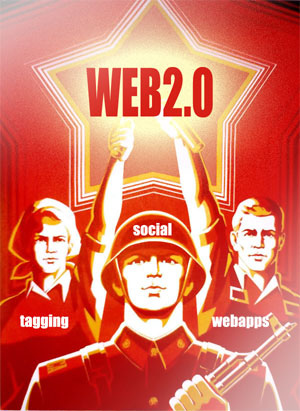
For a long while I didn’t know it had a name, but I noticed the evolution. Web 2.0 is upon us, or rather, it is us.
If you’re reading The Soap Box, there’s a good chance that you’re old enough to remember the early days of the internet. Those days when you had about three options for an ISP using your 14.4 kb modem and had to pay-per-email. We’ve certainly come a long way in a short time.
The internet has evolved into countless ISPs, millions of websites, free email, and connection speeds that put any type of phone modem to shame. While the internet used to be corporate or organizationally driven, it has turned into an outlet for individuals.
From blogging to personal pages on Facebook, MySpace, Xanga, Flixster, to Wikipedia, Wikihow and so many others have empowered individuals to access, use, and share their slice of the internet. What’s more, the number of slices of the internet is pretty much infinite. Anyone with access to a computer, or even a Smartphone or PDA can do it effectively for free. Even the previously standardized web pages like Yahoo, Google, and many others are fully customizable. The web is now all about the user, and scarcely about the provider. Compare this to a Henry Ford quote from the 1910’s “Any customer can have a car painted any color that he wants so long as it is black" versus today’s age where you have dozens of car styles, colors and options to tailor your ride to your personal preference.
With all this personal empowerment, we have achieved the ability to share human knowledge and experiences with the entire world at any time, instantly. Readers of Thomas Friedman’s The World is Flat will recognize everything I’m talking about as part of Globalization 3.0. (If you haven’t read this book, it is highly recommended.) Look at Wikipedia. Its creators designed it as a resource to contain the world’s combined knowledge. And with personal pages on the social networking sites, we can learn more and more about each other as human beings.
Other features of Web 2.0 include the new dynamic of software. When was the last time you purchased software and used your CD-ROM drive to install it? It is far more common now to acquire applications and games from the web. Even the programs you already have utilize the internet to update or sync with a distant source. Or examine the Open Source movement- millions of individuals whom have never met in person are now collaborating to develop software for all sorts of uses, all for free.
When considering at what point this new era began, I don’t think there is a solid answer. The internet has been going through an evolution. Because the web is neither centrally located nor centrally controlled, there was no single force that guided it to where it is now. Certainly the most palpable answer is simply that the individual empowerment started when it became economically feasible to extend this sort of technology to the masses. Like any other major technological innovation, it is generally prohibitively expensive to most in the early stages, but cost goes down steadily and availability increases.
Most of us are only beginning to embrace the possibilities of this new era of the internet. Like all evolutions, it will take time. For now, I’m taking every opportunity to explore new facets of the internet and my stake in it.
I found this picture on Google Images, and it does a bang up job of summing up Web 2.0. It’s eerily reminiscent of the socialist movement.
No comments:
Post a Comment